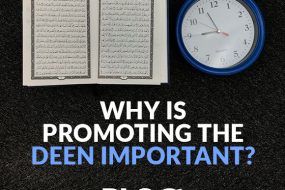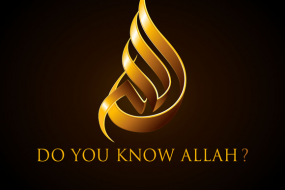
In this article, Grandma Jeddah reveals stories of how the Prophet![]() and his companions interacted with those who have disabilities.
and his companions interacted with those who have disabilities.
In the not so distant past, societal norms placed shame upon parents who had children with disabilities. This custom and perspective of thinking still remains in many families and communities today—even Muslim families!
Such embarrassment can lead not only to denial, but it can also lead parents to isolating their child from the general society. These children may be prevented from attending family functions or outings because their disability might bring the family shame. Some children may even be prevented from marrying once they’ve reached maturity. Secluding children with disabilities from participating in general society is contrary to the manner in which the Prophet![]() dealt with people who had disabilities.
dealt with people who had disabilities.
One remarkable story of how those with special needs were included in society during the time of the Prophet![]() can be found in the story of Julaybib (radiyallahu anhu). He was one of the Prophet’s
can be found in the story of Julaybib (radiyallahu anhu). He was one of the Prophet’s ![]() companions and was also one of the Ansar.
companions and was also one of the Ansar.
Some say the word, Julaybib means small-grown. This alludes to the idea that perhaps he was small and short. Julaybib (radiyallahu anhu) was also described as “damam” which means ugly, deformed, or of repulsive appearance. In addition to his undesirable appearance, he also had another unpleasant aspect about himself—his lineage was unknown. Arabian society at that time considered tribal affiliation of utmost importance in regard to social status. This led to the people of Medina detesting Julaybib even more.
One day the Prophet![]() visited one of the Ansar and asked him to marry his daughter to Julaybib. The Ansari told his wife about the Prophet’s
visited one of the Ansar and asked him to marry his daughter to Julaybib. The Ansari told his wife about the Prophet’s ![]() request. Once she heard this news, the wife grew completely opposed to the idea. Marry her daughter to the deprived Julaybib—never!
request. Once she heard this news, the wife grew completely opposed to the idea. Marry her daughter to the deprived Julaybib—never!
The family’s daughter happened to be listening in and overheard the conversation about her marriage to Julaybib. Soon she came to learn that the Prophet![]() himself had suggested the idea of marriage. On hearing this, she let her parents know that if the Prophet
himself had suggested the idea of marriage. On hearing this, she let her parents know that if the Prophet![]() himself had suggested it, then there must be good in it. And the daughter and Julaybib were married.
himself had suggested it, then there must be good in it. And the daughter and Julaybib were married.
The Prophet ![]() was thoughtful of Julaybib even to the end of the man’s life. Julaybib was killed during one of the Islamic battles. According to hadith, after discovering Julaybib’s lifeless body, the Prophet
was thoughtful of Julaybib even to the end of the man’s life. Julaybib was killed during one of the Islamic battles. According to hadith, after discovering Julaybib’s lifeless body, the Prophet![]() placed his arms around Julaybib and held him in his arms. Then he lowered the martyred man to the ground. The Prophet
placed his arms around Julaybib and held him in his arms. Then he lowered the martyred man to the ground. The Prophet![]() dug Julaybib’s grave himself. And then, he placed Julaybib into the earth.
dug Julaybib’s grave himself. And then, he placed Julaybib into the earth.
This story presents a wonderful example of how the Prophet ![]() treated those considered of “lesser” status due to their disabilities. They should be treated honorably, kindly, and allowed to participate in the joys of everyday living. They should also be allowed to join in the common activities of this world without ridicule.
treated those considered of “lesser” status due to their disabilities. They should be treated honorably, kindly, and allowed to participate in the joys of everyday living. They should also be allowed to join in the common activities of this world without ridicule.
Here’s another celebrated story of one disabled companion who was nobly honored and whose story has been preserved for over 1400 years! His story is so greatly renowned because Allah![]() mentions him in the Quran. He is the blind man.
mentions him in the Quran. He is the blind man.
Abdullah Ibn Umm Maktum (radiyallahu anhu) was born blind. He was a cousin of the Prophet’s wife Khadijah (randiyallahu anha). He was eager to learn more about Islam. Once he approached the Prophet![]() as he was busy talking about Islam to some very important leaders of Mecca. Abdullah then asked the Prophet
as he was busy talking about Islam to some very important leaders of Mecca. Abdullah then asked the Prophet![]() , ”O Messenger of God, teach me from what God has taught you.”
, ”O Messenger of God, teach me from what God has taught you.”
As is common when people are busy and tending to important matters, the Prophet ![]() ignored Abdullah’s question. He frowned at the man, then turned away and continued his conversation with the prominent heads of Mecca.
ignored Abdullah’s question. He frowned at the man, then turned away and continued his conversation with the prominent heads of Mecca.
Not long after this incident, the Prophet ![]() received revelation from Allah The Most High. His Lord sent down 16 verses in all, correcting the Prophet
received revelation from Allah The Most High. His Lord sent down 16 verses in all, correcting the Prophet![]() for neglecting to respond to the blind man’s question. (Surah Abasa 1-16)
for neglecting to respond to the blind man’s question. (Surah Abasa 1-16)
From this moment on, the Prophet![]() was very careful to treat Abdullah Ibn Umm Maktum (randiyallahu anhu) with respect and generosity. When the Muslims migrated to Medina, the Prophet
was very careful to treat Abdullah Ibn Umm Maktum (randiyallahu anhu) with respect and generosity. When the Muslims migrated to Medina, the Prophet![]() appointed Abdullah along with Bilal to be the muedhins in Medina, which was a respectfully high honor. The Prophet
appointed Abdullah along with Bilal to be the muedhins in Medina, which was a respectfully high honor. The Prophet![]() also chose Abdullah to be in charge of Medina when he was away for important matters. In fact, he even left him in charge of Medina during the illustrious event of liberating Mecca.
also chose Abdullah to be in charge of Medina when he was away for important matters. In fact, he even left him in charge of Medina during the illustrious event of liberating Mecca.
Not only did the Prophet![]() place Abdullah (randiyallahu anhu) in noble positions within society, so too did Umar (randiyallahu anhu). Umar (randiyallahu anhu) even gave Abdullah (randiyallahu anhu) the honor of carrying the flag of Islam during the Battle of Qadisiyyah. Abdullah (randiyallahu anhu) died in that battle clutching the flag. He had once said “Place me between two rows and give me the standard. I will carry it for you and protect it, for I am blind and cannot run away”. 1
place Abdullah (randiyallahu anhu) in noble positions within society, so too did Umar (randiyallahu anhu). Umar (randiyallahu anhu) even gave Abdullah (randiyallahu anhu) the honor of carrying the flag of Islam during the Battle of Qadisiyyah. Abdullah (randiyallahu anhu) died in that battle clutching the flag. He had once said “Place me between two rows and give me the standard. I will carry it for you and protect it, for I am blind and cannot run away”. 1
From the above stories of the Prophet![]() and his companions, we can clearly see that those who are disabled should be allowed to participate in all realms of society they are capable of involving themselves in. They should also be considered an essential part of society. The Prophet
and his companions, we can clearly see that those who are disabled should be allowed to participate in all realms of society they are capable of involving themselves in. They should also be considered an essential part of society. The Prophet ![]() did not consider one’s disability as something that should prevent a person from living a normal life. Children who have disabilities should not be humiliated, rejected, or discriminated against, based upon their disability. Instead, their family and community should assist them with their special needs and with what will help them become functionaries in society.
did not consider one’s disability as something that should prevent a person from living a normal life. Children who have disabilities should not be humiliated, rejected, or discriminated against, based upon their disability. Instead, their family and community should assist them with their special needs and with what will help them become functionaries in society.
What are some ways in which we can change the wrong mindset of people when it comes dealing with children or adults who have disabilities? Please share your suggestions in the comments section below. 🙂
References:
- Companions of The Prophet”, Vol.1, By: Abdul Wahid Hamid ↩








2 replies on “Special Needs: The Other Taboo”
Islam is religious where you may content with Allah (swt) anytime, whatever you have done in your past, Just have a strong believe that Allah (swt) forgive you. Allah (swt) is great power and Allah (swt) love those who always keep praying.
Yes no doubt Allah can forgive us if He wants to , May Allah forgive all Muslims and guide us to the right path , Ameen